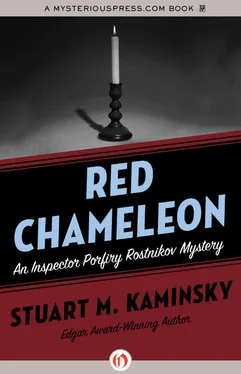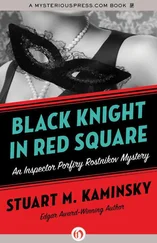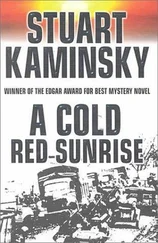Stuart Kaminsky - Red Chameleon
Здесь есть возможность читать онлайн «Stuart Kaminsky - Red Chameleon» весь текст электронной книги совершенно бесплатно (целиком полную версию без сокращений). В некоторых случаях можно слушать аудио, скачать через торрент в формате fb2 и присутствует краткое содержание. Год выпуска: 2012, ISBN: 2012, Издательство: MysteriousPress.com/Open Road, Жанр: Полицейский детектив, на английском языке. Описание произведения, (предисловие) а так же отзывы посетителей доступны на портале библиотеки ЛибКат.
- Название:Red Chameleon
- Автор:
- Издательство:MysteriousPress.com/Open Road
- Жанр:
- Год:2012
- ISBN:978-1-4532-6632-8
- Рейтинг книги:4 / 5. Голосов: 1
-
Избранное:Добавить в избранное
- Отзывы:
-
Ваша оценка:
- 80
- 1
- 2
- 3
- 4
- 5
Red Chameleon: краткое содержание, описание и аннотация
Предлагаем к чтению аннотацию, описание, краткое содержание или предисловие (зависит от того, что написал сам автор книги «Red Chameleon»). Если вы не нашли необходимую информацию о книге — напишите в комментариях, мы постараемся отыскать её.
Red Chameleon — читать онлайн бесплатно полную книгу (весь текст) целиком
Ниже представлен текст книги, разбитый по страницам. Система сохранения места последней прочитанной страницы, позволяет с удобством читать онлайн бесплатно книгу «Red Chameleon», без необходимости каждый раз заново искать на чём Вы остановились. Поставьте закладку, и сможете в любой момент перейти на страницу, на которой закончили чтение.
Интервал:
Закладка:
The cars and buses beeped, braked, and chugged noisily around the Triumphal Arch, but Karpo paid no attention. A passing group of Japanese tourists simply assumed the pale man was mad or meditating; in fact, they were quite close to the truth. Karpo never gave a label to his moments and even hours of concentration. He simply lost himself in the problem to which he had been assigned. His logic was unquestionable. He was a policeman. His job was to prevent crime or bring to justice those who committed a crime. Any crime was a threat to the state, an indication that the criminal did not respect the Party, the Revolution, and the need for total dedication. If there was any meaning to existence for Karpo, it was that the commonweal must be respected, sustained. His dedication to Leninist communism was complete, though he did not see Lenin as a god. Lenin had been a man, a man dedicated to the eventual establishment of a world as close to perfection for all as would be possible, given the weaknesses of the animal that was man.
Little more than a month earlier, Emil Karpo had stopped a terrorist from damaging and possibly destroying Lenin’s tomb. Karpo expected no reward for his action. Indeed, the government had even covered up the incident and labeled the bomb damage in Red Square “a gas-line explosion.” Karpo had awakened days after the incident to face an incompetent doctor who told him he would soon have the use of his right hand again if he engaged in the proper therapy. The woman had spoken with confident calm as she stood over his bed, but one of the several weaknesses of the system that Karpo recognized and expected to see changed was the low level of competence of physicians.
Karpo had not even bothered to nod his acknowledgment at the porcine woman. She had made the mistake of trying to wait him out, but he simply stared at her for five minutes, and she left in angry defeat. Two weeks later he left the hospital and ignored Rostnikov’s suggestion that he see a doctor who might know what he was talking about.
“My wife’s cousin,” Rostnikov had said, looking at Karpo’s arm. “He’ll look at you. He’s good, Jewish.”
Karpo had declined, abruptly indicating his confidence in the system. In his small monastic room each night Karpo had attempted the exercises suggested by the hospital therapist, but they did no good. There was no doubt in Karpo’s mind that he would never regain the use of his right arm, and so instead of continuing the useless therapy, he had spent silent hours teaching himself to be left-handed. Left-handedness was discouraged in Russia. Russian children caught using their left hand to throw, write, or eat were sternly stopped. Karpo had never thought much about this, assuming the idea of conformity was simply part of one’s education in an overpopulated society. But now Karpo had to become left-handed. He wrote slowly, carefully, in his notebooks, his private volumes of detailed reports on every case to which he was assigned. He wrote about the new case to which he had been assigned and wondered why it had been given to him and not to his superior, Porfiry Petrovich Rostnikov. He wondered but did not speak of his wonder as he learned to write with his left hand and constructed the details about the sniper who was shooting at people from the rooftops in Central Moscow.
There had been five shootings, three resulting in death. There had been no real clues besides the bullets, with the possible exception of the report by the drunken night porter of the Ukraine Hotel who swore that he heard someone weeping loudly on the roof of the hotel on the night of the third shooting. Since the bullets had certainly come from the hotel roof, the sniper had been given the nickname the Weeper, but it was a nickname only a few in Petrovka shared. No word of the snipings had been heard on the radio or television, and no reports had appeared in the press.
The Weeper would go on killing without the people of Moscow knowing of it until he or she was caught or the shootings became pandemic. It was, Karpo was sure, better this way. There was nothing to be gained from alerting the public to this crime. There were no safeguards to be taken. There was nothing to do except catch the sniper and turn him over for a quiet trial, or perhaps no trial at all.
So Karpo had learned to drink his black tea with his left hand, to dress himself with his left hand, and to write his clear, precise notes with his left hand. Deep within him, as he adjusted to the change, he considered what might happen if the procurator learned that his disability was permanent. It was inevitable, but until that inevitable moment came, he would continue to work as he had for twenty-two of is forty-three years.
And so it was that on a hot August morning Emil Karpo stood in front of the statue below the general and in front of the pedestal on which were carved life-sized images of the commanders, soldiers, and partisans who had long ago risen to the defense of their country.
Twenty minutes after he had taken up his vigil in the square, Karpo saw the man he had been waiting for. The man was about sixty, wearing a dark and slightly shabby hotel uniform. In his right hand was a small cloth sack. Instead of joining the flow of tourists, the man sought out a bench, found an empty seat, and looked around, squinting against the sun. Not finding what or who he was looking for, he opened his sack lovingly and removed a sandwich wrapped in newspaper and a small box from which he began to remove dominoes. An overweight woman on the far end of the bench who had stopped to catch her breath, a task she might never accomplish, glanced at the old man, who appeared to be offering her a game. Karpo could see the man’s mouth moving and the woman nodding her head no as he left the statue and moved forward.
Karpo brushed by a couple trying to figure out a visitor’s map and approached the bench, standing between the old man and the sun, throwing his shadow over the black dominoes the man was placing on the bench. The fat woman looked at Karpo and forced herself up, pretending to see someone she knew. Karpo ignored the open space on the bench and stood over the man, who looked up at the dark outline before him.
“A game?” the man said. His teeth were in bad condition, but he was clean-shaven and, in spite of the hot weather, not nearly as rancid as many who worked in heavy uniforms were in the summer.
“Pavel Mikiyovich?” Karpo asked, though he knew this was the man.
Mikiyovich squinted up curiously, then with fear, and then with Moscow indifference, feigned and protective.
“I know you?” he said.
“Inspector Karpo. Police.”
Two little girls, about ten or eleven, in matching school dresses strolled by arm in arm and giggled at the two men, whispering.
“It’s just dominoes,” Mikiyovich said, holding up a double two to prove his point. “I’m not gambling.”
“The man who wept,” Karpo said. “The sniper.”
Mikiyovich let out a small sigh of relief and gummed a bite of sandwich.
“I told the other man from the police everything,” Mikiyovich said, looking at his sandwich, the tiles, anything to avoid the tall man who blocked the sun. “I’m on my lunch break. I’ve only got-”
“I was told I could find you here,” Karpo interrupted. Karpo had read the report of the interview. It had been brief, and had he any other reasonable leads, he would not have bothered with this requestioning, at least not yet, but the chance existed that a new lead might arise.
Mikiyovich shrugged, resigned. He wondered if the man above him had only one arm or was scratching his stomach.
“He wept,” Mikiyovich said, raising his arms, the remnant of sandwich in one hand, a domino in the other. “I was getting some air on the roof at nine.”
“You went to the roof to drink,” Karpo corrected.
Читать дальшеИнтервал:
Закладка:
Похожие книги на «Red Chameleon»
Представляем Вашему вниманию похожие книги на «Red Chameleon» списком для выбора. Мы отобрали схожую по названию и смыслу литературу в надежде предоставить читателям больше вариантов отыскать новые, интересные, ещё непрочитанные произведения.
Обсуждение, отзывы о книге «Red Chameleon» и просто собственные мнения читателей. Оставьте ваши комментарии, напишите, что Вы думаете о произведении, его смысле или главных героях. Укажите что конкретно понравилось, а что нет, и почему Вы так считаете.












